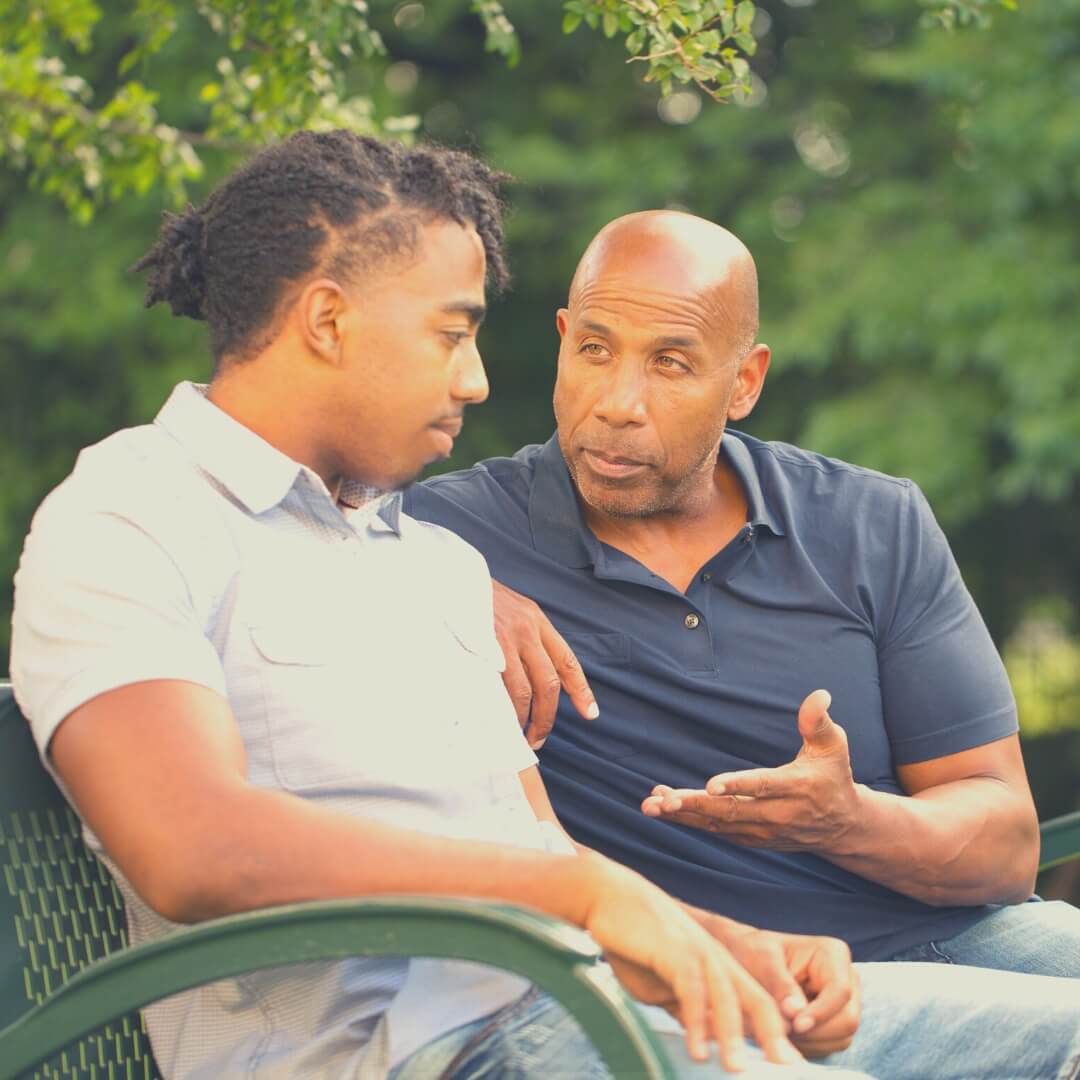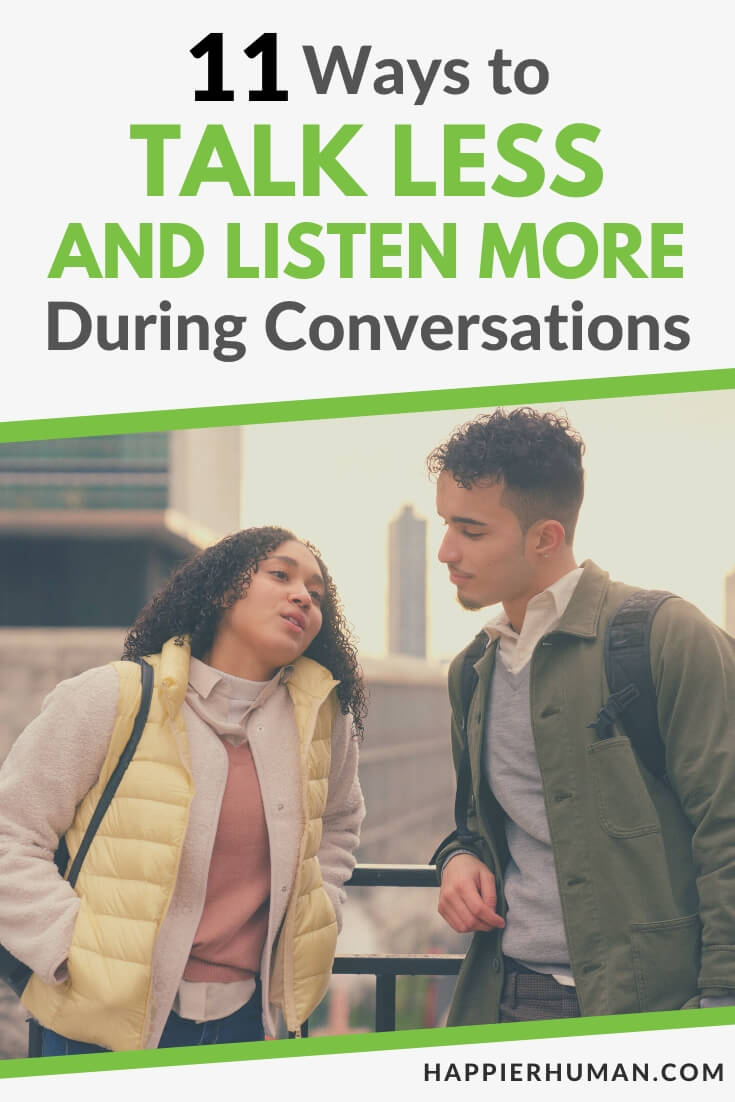There might be affiliate links on this page, which means we get a small commission of anything you buy. As an Amazon Associate we earn from qualifying purchases. Please do your own research before making any online purchase.
We all have the “one friend” that talks non-stop. You call or meet her to share something important, or just to tell her about your day, and she starts going like a lawn mower or small engine.
You can't get a word in. You look at her face to see if she's breathing because it doesn't seem like she's paused to take a breath.
If you haven't experienced this with others, maybe you are the talkative friend.
The purpose of conversing with others is to gain a connection. To exchange ideas, thoughts, and opinions with others that have our best interests at heart. However, our relationships become one-sided when one person dominates the conversation by talking relentlessly.
Why Do Some People Talk So Much?
According to psychologists, people who talk a lot aren’t always aware of their behavior. Here are a few reasons why they do it.
No matter the reason, it can cause others to be frustrated, anxious, and give up on the conversation. Those involved feel their opinions aren't important, and the person undervalues what they say.
Personally, I often feel conversations like this were a waste of my time and took away from other things I wanted or needed to be doing.
I have a friend (who will remain nameless) that texts me and asks if I have time to talk. Later, when we are on the phone, she starts talking without taking a break.
I finally resorted to raising my voice and interrupting her just to say one thing or let her know I needed to get off the phone. Unfortunately, one time I hung up and texted her to say that I would catch up with her another time.
The Importance and Benefits of Being a Good Listener.
In any relationship, it is essential to be a good listener. Good listeners don't just hear what a person is saying, but they listen to understand what a person is saying and their point of view. Conversations should go both ways.
So, it can be disheartening when someone talks too much. We all like to feel someone understands us, so to gain understanding, there needs to be dialog back and forward between the parties in the conversation.
When people talk excessively, it can be very aggravating. Still, we reward their behavior by continually engaging in conversation with them. I am not saying that we handle it as I did with my talkative friend, but there needs to be some boundaries set within the conversations.
If we are the talkative ones in conversations, people may have set boundaries with us without our knowing. Here are a few signs that you talk too much:
The same ways others set boundaries when you're overly chatty are good techniques to employ when dealing with someone else doing the same. So, give yourself permission to set boundaries and enforce them as needed.
Admit to yourself that the conversations you have with others are unhealthy. Either you are dominating the conversation, or someone else is.
11 Ways to Talk Less and Listen More During Conversations
1. Ask Questions to Get the Other Person Talking.
An excellent way to become a better listener during conversations is to ask the other person questions to get them talking.
By doing so, you help the other person feel accepted and heard. They will appreciate that you genuinely desire to listen to what they say, which will mean much to them.

Asking questions takes the focus off you and places it on them. But don't just ask questions randomly, but make sure the questions are relevant to them and the conversation.
2. Be A Purposeful Listener.
None of us can actively engage in listening and talking at the same time. So, when we are purposeful about hearing what is in a person's heart, we are well on our way to listening more and talking less.
Most people listen to others in order to respond. It seems practical when a person asks for advice. However, we need to hear what they are saying so that we can offer an answer.
Then, we make the effort to go a step further and listen in order to understand. This not only helps to make us more effective listeners but causes our words to be meaningful when we speak.
There is no better way for a person to feel heard and validated than when a person understands their perspective on a matter.
3. Be Concise in Your Conversation.
Have you ever had someone tell you the details of their day and give you extra information irrelevant to the topic of discussion. For example, Andre's wife Maria comes home from a shopping trip and tells him, “I will never shop at that store again!” Naturally, Andre asks Maria why she feels that way.
She says, “First when I arrived at the store, I had to move shopping carts out of the way so that I could park. Then, these people were on the sidewalk having a bake sale, harassing me about buying one of their cakes. I am on a diet, so that was out of the question.
But I started to buy one for you; I know how much you love red velvet cake. Oh, I saw Aaron at the store, and he said hello. You know his grandson is growing like a weed. You should call Aaron and catch up. How long has it been since the two of you hung out?”
Andre then asks Maria to get back to the point.
So, she continues, “When I went in the store, there were no shopping carts available, so I had to go back outside and get one. Then those people selling cakes started harassing me again. One lady, in particular, seemed snooty when I declined. But the cake didn't look all that good anyway. And her hair looked like she just rolled out of bed.”
To this day, Andre still doesn't know precisely why Maria will never shop at that particular store again.
Being concise is getting to the point and being mindful to leave out unnecessary details of your story.
4. Remember, You Don't Have to Tell People All of Your Business.
Nothing makes a social experience more awkward than a person giving out TMI (Too Much Information). When speaking of our personal experiences, there is a level of vulnerability that comes with it, and it can lead to meaningful, heart-felt conversation.
But when we are too personal about things of a sexual nature and bodily functions, the conversation goes from good to weird. So, it is best to stick with the details, allow others to share their feelings, and be a good listener.
It would be best to resist the urge to overshare or emotionally dump on someone. Brandy asked her acquaintance Lilly if everything was going okay for her since she hadn't seen her post anything on Instagram in a while.
Lilly began to share how life had been hard, and she received new medications to help her with depression. She had recently lost her dog, and because of the depression, her boyfriend dumped her.
The best way to respond was simply to say, “I have had a lot going on in my life lately, so I took a break from social media.”
5. Repeat a Person’s Words Back to Them Before Responding.
Repeating words back to a person shows them that you are paying attention to what they are saying. We all want to be understood and valued; this is a great way to actively listen and give others that special feeling.
This way of communicating also helps you ensure you have a clear understanding before saying something to the person out of turn. And when you repeat the words, wait for the speaker's validation so that you know you heard them correctly.

This topic reminds me of an episode of Family Feud. The host had trouble understanding a contestant's answer to a question due to his accent.
The host goes on to scold the contestant for having a crazy answer before finally realizing he misunderstood the contestant's answer. When the host finally understood, he looked silly and turned it into a joke to smooth things over.
This may make for good footage in a game show. Yet, with more critical matters, it’s vital to repeat words back and get confirmation before responding.
6. Pay Attention to their Non-Verbal Cues.
Non-verbal cues can show us we’re talking too much and need to listen more. Suppose you are speaking to others, and they are always backing away from you or taking steps toward the exit. In that case, that is an excellent indicator that you’re talking a little too much.
More subtle cues you may see are a person constantly looking at their watch or phone, yawning, leaning away from you, avoiding eye contact, looking bored, or mentioning that they need to leave. Most of the time, they try to find polite ways to end the conversation and spare your feelings.
7. Make Them Aware that You Aren’t the Best Listener, But You’re Trying to be Better at it.
If we are honest, we are not all the best listeners in the world. It wouldn’t be a bad thing to tell someone when they are looking to share something with you.
This bit of information gives them a reason to be more purposeful in what they say. It ensures you understand them as they navigate through their story.
Remember, this is not an excuse to get out of listening to others. But it would help if you sincerely wanted to improve your listening skills.
8. Don’t Let Your Ego Get in the Way.
People talk over others because of a disinterest in what they have to say or due to a lack of self-confidence.
They feel the need to sound important and fascinate those listening. Many like this are also self-absorbed and arrogant and feel anything another has to say is not as important or exciting as what they desire to share.
Remember, you aren’t the center of everyone’s universe, and seeking to gain the approval of others may give you a superficial ego boost for the moment but won’t boost your overall self-esteem.
9. Be Comfortable with Moments of Silence.
Silence gives others a chance to jump in. You can be so passionate about a subject that you talk non-stop. Still, you’re not only depriving others of the opportunity to share their opinions, but you don’t give them a break to process everything you just said to them.
A moment of silence in conversations also allows you to think before blurting something out that is irrelevant or that you didn’t mean to say. And you want to appear calm and confident when having a conversation. Being comfortable with moments of silence makes that happen.
Lastly, jumping in to share a point before pausing can cause you to miss important pieces of information a person wants to share. They may not be done expressing their feelings, so again, you don’t want to answer prematurely.
10. Focus on the Person Talking to You.
To be a better listener, it is best to proactively eliminate distractions you may have during the conversation.
It’s nothing more disheartening to a person than to try communicating something important to someone, and they are constantly getting text messages, cell phone calls, or they appear distracted in some way. You should silence your phone and give the person your undivided attention.

When you pay attention to anything more than the person speaking, you portray a message to them that the things they are saying aren’t a priority to you, and neither are they.
11. Don’t Offer Unsolicited Advice.
We are all guilty of this from time to time. People may be looking to vent their frustrations and blow off some steam. They aren’t necessarily looking for us to fix their situation or tell them what we would do if we were them.
Giving unsolicited advice will push others away from us, and they lose confidence in us as someone with whom they can express their feelings.
I had to realize this with my sisters. I noticed how I was always the last to know when something major was going on in their lives. My sister Dianna started to share her situation with me, and I quickly started in on her about what she needed to do to fix the problem. I even questioned how she let it happen in the first place.
Mid-sentence, after listening to myself, I realized what I was doing and saw that my lack of empathy wasn’t helping.
So, I quickly apologized to Dianna and simply told her I was always there for her if she needed me. From that day, I no longer offer unsolicited advice. Now she no longer leaves me out of important details going on within the family.
You may have been doing this for years, and honestly, you’re wired to be a fixer. But it takes great discipline and assessing the conversation to decide when to listen or give advice.
Final Thoughts on How to Talk Less
Now that you’ve read our tips for becoming better listeners and learning how to talk less, I hope you have become more self-aware of your behavior. I also believe you have received sound advice on becoming a better communicator.
A conversation is not one-sided, where a single person expresses their points of view, their advice, and overall experiences. It's about sharing one another's experiences and building and growing upon meaningful connections with others.
May you find this article to be a helpful tool to grow your relationships with your family, with your friends and neighbors, on the job, and in social gatherings among strangers.
And if you're looking for more articles about listening and communication, be sure to check out these blog posts:
- 9 Techniques to Improve Your Empathic Listening Skills
- Hearing VS Listening: 5 Key Differences
- 13 Strategies to Counter the Silent Treatment in a Relationship


